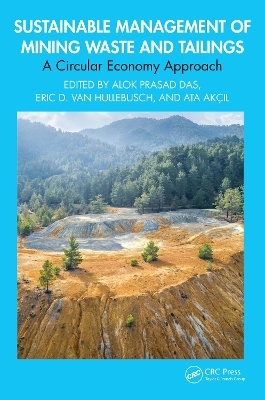
Sustainable Management of Mining Waste and Tailings
CRC Press (Verlag)
978-1-032-58081-4 (ISBN)
Integrating waste management, environmental sustainability, and economic development is a prime milestone in the circular economy. Critical metals recovery from mining tailings and secondary resources has significant potential, with widespread applications in high-tech industries that are critical to modern society and sustainable development. This book discusses technological advances for managing industrial and mining waste through circular economy approaches and successful critical metal recovery from secondary resources. It highlights how reprocessing of mine waste and tailings results in development of critical raw materials that significantly reduce the mining burden and ensure the lucrative use of waste materials.
Features:
Describes advances in remediation and valorization technologies for mining wastes
Details biotechnological methods, cutting edge research, and applications
Covers use of waste mining resources for economic growth and novel opportunities
Discusses IR4.0 and machine learning methods
Includes reports and case studies on mining waste in value-added products and recovery of strategically important critical minerals
This book will be of value to researchers and advanced students working in the mining, chemical and environmental engineering, and renewable energy sectors.
Dr. Alok Prasad Das is serving as Assistant Professor in Department of Life Sciences, Rama Devi Women’s University, Odisha, India. He is an academician and author of several books, journal articles and Editorial Member of several reputed journals. He has more than 15 years of research experience. His area of expertise includes: wastewater treatment, environmental microbiology, environmental pollution and management, microplastic and microfiber pollution, bioremediation for sustainable solutions. He is the editor of several books. He has published more than 100 research and review articles in international journals of repute. He is an active lead guest editorial board member in top-rated journals. His current Google Scholar: Citations is 2790 and h-index 29. Dr. Alok Prasad Das is also listed in the world ranking of top 2 percent scientists for 2023, drawn up by Stanford University of USA on the basis of subject-wise analysis. Prof. Eric D. van Hullebusch received his PhD (Aquatic Chemistry and Microbiology) from Université de Limoges (France) in 2002. From November 2002 until October 2004 he was a Marie Curie Postdoctoral fellow at Wageningen University & Research (the Netherlands) where his research focused on the optimization of anaerobic granular sludge reactors by studying the speciation, bioavailability and dosing strategies of trace metals. In 2005, he was appointed as associate professor in biogeochemistry of engineered ecosystems at Université Paris-Est (France). From September 2016 until August 2018, he worked at IHE Delft as chair professor in Environmental Science and Technology and head of the Pollution Prevention and Resource Recovery chair group. In September 2018, he joined Institut de Physique du Globe de Paris (France) as full professor in Biogeochemistry of engineered ecosystems. Prof. van Hullebusch has published more than 280 peer-reviewed papers (about 14500 citations, h-index 62) in the field of biogeochemistry of metals and metalloids in engineered ecosystems. His research is currently mostly focusing on the implementation of biohydrometallurgical approaches for the recovery of technology critical elements as well as polluted soils (bio) remediation. Professor Ata Akçil is a professionally registered engineer with 32 years of experience in process, hydrometallurgical & biohydrometallurgical engineering, mineral processing, waste management, engineering services, teaching, research, professional service, consulting, management and industrial plant operations. Professor Akçil obtained his Ph.D. of Mineral Processing &Hydrometallurgy in 1999 from the Dokuz Eylul University (Turkey). He worked as Research Assistant (by 1999), Assistant Professor (by 2005), Associate Professor (by 2010) and Full Professor (by 2023) at the Akdeniz University and the SDU (Turkey). He is also an Adjunt Professor (since 2023), Beijing University of Chemical Technology, China. Professor Ata Akçil is also a technical senior expert for critical and strategical raw materials and resource recovery, and he is now an active editorial board member in 4 peer-reviewed scientific journals and is author & co-author in 200 research papers, 1 book, 10 book chapters, 60 International Conference proceedings and 11,500 citations (h-index: 48).
Chapter 1. Novel methods and techniques for the remediation of mining wastes residues. Chapter 2. Emerging and advanced green energy technologies for mining pollution reduction. Chapter 3. Green Technologies for Mining Waste Management. Chapter 4. Remediation of mining waste residues through innovative methods. Chapter 5. Innovations in Advanced Technologies for Green Energy Generation, Carbon Neutrality, and Mining Waste Management. Chapter 6. Bioremediation as a sustainable and circular solution for mining waste management and bioenergy generation. Chapter 7. Machine learning applications in mining waste management. Chapter 8. Bioprocesses For Sustainable Management of Mine Waste In Contaminated Environmental Matrices. Chapter 9. Use of Machine Learning Techniques in Mining Waste Treatment: Example and Applications in Turkey. Chapter 10. Sustainable Management of Bauxite Residue: Opportunities and Challenges. Chapter 11. Advancing Mining Sustainability Metrics: The Ecological Engineering Nexus Accounting Framework (EENAF). Chapter 12. Management and recycling of mining wastes with zero waste adaptation technology as a tool for sustainable environmental management. Chapter 13. Sustainable Remediation Method for Wastes from Mining Activity. Chapter 14. Sustainable Strategy for Metal Mining Solid Waste Management through Vermitechnology. Chapter 15. Development of novel processes and products from mining residues
| Erscheinungsdatum | 13.06.2024 |
|---|---|
| Zusatzinfo | 25 Tables, black and white; 34 Line drawings, black and white; 5 Halftones, black and white; 39 Illustrations, black and white |
| Verlagsort | London |
| Sprache | englisch |
| Maße | 156 x 234 mm |
| Gewicht | 821 g |
| Themenwelt | Naturwissenschaften ► Biologie ► Ökologie / Naturschutz |
| Naturwissenschaften ► Chemie ► Technische Chemie | |
| Technik ► Bauwesen | |
| Technik ► Umwelttechnik / Biotechnologie | |
| ISBN-10 | 1-032-58081-X / 103258081X |
| ISBN-13 | 978-1-032-58081-4 / 9781032580814 |
| Zustand | Neuware |
| Informationen gemäß Produktsicherheitsverordnung (GPSR) | |
| Haben Sie eine Frage zum Produkt? |
aus dem Bereich


